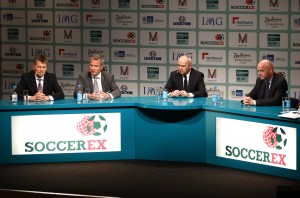Soccerex European Forum: Manchester (March 2012) – UEFA’s Centralisation of Media Rights
Day 1: Wednesday 28 March 2012
10:00 – 10:45 UEFA’s Centralisation of Media Rights
- Matt Lorenzo (Head of Media, Soccerex) [Moderator]
- Gianni Infantino (General Secretary, UEFA)
- Guy-Laurent Epstein (Marketing Director, UEFA)
- Denni Strich (Marketing Director, Deutscher Fussball-Bund)
- Niall Sloane (Controller of Sport, ITV)
This session began with a presentation from Gianni Infantino. He outlined that the intention of the deal was to provide financial stability to the various European National Associations and would come into effect from 2014. Amongst the expected Benefits would be:
- Centralised organisation by UEFA of fixtures (this was previously carried out between each country);
- A single point of sale to the media;
- Increased branding revenues and sponsorship.
The agreement would also see the introduction of ‘The Week of Football’, which meant that the dates and way international qualifiers were staged, would be changed, with double-header matches staggered across a period from Thursdays to Tuesdays. These would have uniform kick-off times and be promoted to provide maximum exposure.
Guy-Laurent Epstein followed the opening presentation in detailing how UEFA was aiming to create value for broadcasters and an opportunity to cover football across a whole week of football at a time when there was no other football being played. It would also provide greater choice for viewers, with 9 games available on any given day. He outlined how there would be a branded ball which would be used during Qualification and the Finals and options regarding advertising boards, which would allow Associations to take, none, some or all of the UEFA sponsor options.

Denni Strich accepted that the German National Team already had a strong profile and identity, but that this agreement is about the question of solidarity and the desire to strengthen and to develop other smaller National Teams.
From a broadcasting perspective, Niall Sloane believed that dealing with one entity will make life easier in terms of negotiation, but will be interested to see the details of the various packages and how they will work in practice. He added that he could see it as an opportunity to show games (other than those involving the Home Nations) on channels such as ITV4. Sloane was also interested to see what the impact might be on the future of friendly internationals.
Matt Lorenzo asked whether this was a battle between the Champions League and the European Championship and was answered with a definite ‘no’, from the UEFA panellists, who insisted this was about the need to strengthen and create a passion and unique identity for both the Qualification and Finals of the tournament at international level.
The session ended with questions from the audience. The first question to the panel asked whether that with 24 teams due to qualify for the Finals in France 2016, would this detract from drama as more teams would qualify and be under less pressure. Gianni Infantino responded that he hoped that it would have the opposite outcome, in that more teams would have something to play for and therefore more games would have meaning. He acknowledged though that the situation would be reviewed and if the larger qualification and Finals didn’t work, then it could be changed.
There then followed two separate questions, as the audience sought clarification as to why the English Football Association had not signed the final agreement. The UEFA response was that the outstanding points to resolve were minor and it was not an issue.
The panel was then asked how this deal would work, when for example within the Confederation of African Football, bigger countries (such as Egypt and South Africa) want their own media and sponsorship deals. Denni Strich responded that the European agreement gives UEFA the authority to do the best for all concerned and that all the National Associations have bought into that and importantly accepted that together they were stronger and therefore in a better position.
It was asked whether it was conceivable a single broadcaster could broker a pan-European deal. However, Guy-Laurent Epstein believed this would be highly unlikely.
The final question of the session asked whether this proposal was this the last chance for International football given the strength and influence of the Champions League. Gianni Infantino accepted that currently audiences and sponsorship varied greatly amongst the various European national teams; however this agreement wasn’t about ‘Club v Country’, but an opportunity to strengthen the international game and its associations in Europe.